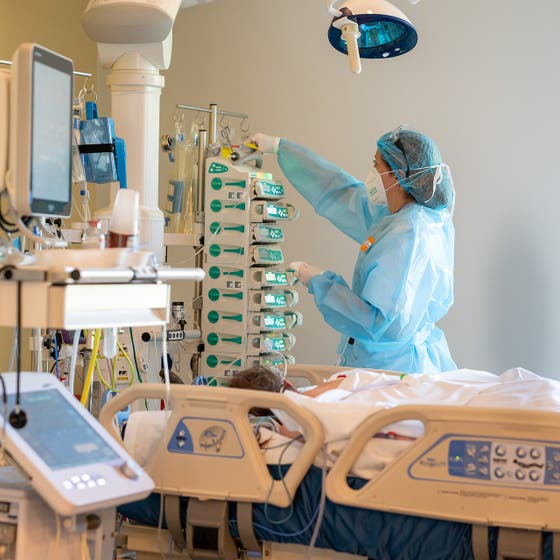International Trial of SARS-CoV-2 Convalescent Plasma Pauses Enrollment of Critically Ill COVID-19 Patients

This decision based on an initial analysis of all severely ill COVID-19 trial participants requiring intensive care unit (ICU) support. This analysis showed that convalescent plasma did not improve outcomes in this group. There was no evidence of harm associated with the administration of convalescent plasma. The trial is continuing to recruit hospitalised COVID-19 patients who are moderately unwell and are not requiring intensive care. Senior investigators are asking people to continue donating plasma.
Convalescent plasma, a blood component containing antibodies against the SARS-CoV-2 virus, is obtained from people who have recovered from COVID-19. The underlying hypothesis is that these antibodies neutralize the virus, prevent further replication and halt ongoing tissue damage.
The analysis was performed for the trial’s independent oversight board, based on 912 participants who were severely ill and had outcome data available. The analysis showed that overall convalescent plasma was unlikely to beneficial (there was a very low probability, 2.2%, that it decreased the number of days requiring intensive care support or death by more than 20%.
However, this initial analysis did not examine the effect of convalescent plasma in moderately ill patients. Whether the use of convalescent plasma leads to better outcomes in hospitalised patients with less severe disease remains a very important question. Recruitment of such patients will continue in the trial.
The trial has now paused to enable completion of follow-up of all enrolled participants. We await a more complete analysis based on data from more than 2000 severely ill patients recruited in the trial, including if any subgroups of patients derived benefit from this treatment. These findings are therefore preliminary and may change when all the analyses have been completed.
Manu Shankar-Hari PhD, an NIHR Clinician Scientist and Professor of Critical Care Medicine at Guy’s and St Thomas’ NHS Foundation Trust in London, said: “We are publicly sharing the preliminary data to ensure that learning happens at pace for determining best treatments for COVID-19. Further data on all the trial participants, including whether particular patient subgroups may benefit, will be forthcoming.
“We are incredibly grateful to all the trial participants, plasma donors, clinicians, blood bank services, and research staff who help us understand the best treatments for COVID-19.
“It is biologically plausible that patients who are not producing antibodies at the time of convalescent plasma therapy and those patients with excess virus may benefit more than others. Our additional analyses will explore this. Aside from these severe patients, patients who are moderately ill and patients with immune impairments may benefit.
“It is therefore vital that plasma donations continue.”
Alexis Turgeon MD MSc, Critical Care Physician and Scientist at CHU de Québec-Université Laval and Professor of Critical Care Medicine at Université Laval in Québec City, Canada, said: “Why convalescent plasma does not seem to improve outcome in severely ill COVID-19 patients admitted to the ICU is not yet known. However, it may be because the lung damage is too advanced for convalescent plasma to make a difference.”
Anthony Gordon, Professor of anesthesia and critical care at Imperial College London and an NIHR research professor “I am glad REMAP-CAP has been able to provide important evidence about which patients might benefit from convalescent plasma. Although it is disappointing that all critically ill patients don’t appear to gain any benefit, this is still vitally important to know.
“Convalescent plasma is a precious resource, and we can now continue to focus on identifying exactly which patients might benefit the most from treatment - maybe people earlier in their illness or those with weak immune systems.”
Dr Lise Estcourt, Consultant Haematologist and lecturer at the University of Oxford, said: “I want to thank all the clinical and research staff, convalescent plasma donors, participants and their families and blood services around the world, who have been involved in the REMAP-CAP trial, it has been a truly global effort. We have randomized over 2000 severely ill participants to the trial, and the analysis of this patient group is just starting. I am looking forward to seeing the final results.”
The trial, which spans three continents, has the goal of assessing the benefit of convalescent plasma to treat moderately ill hospitalised or severely ill adults requiring ICU support for COVID-19, compared to standard care in these patients. To meet the challenge of this pandemic, investigators worldwide joined forces to answer this question.
The trial is supported by multiple international funding organisations including the Canadian Institutes of Health Research, the Australian National Health and Medical Research Council, the Health Research Council of New Zealand, the National Institute for Health Research (UK), UPMC, Translational Breast Cancer Research Consortium, and the Pittsburgh Foundation, and the EU PREPARE and RECOVER consortia. In the UK this study is one of a number of COVID-19 studies that have been given urgent public health research status by the Department of Health and Social Care.
